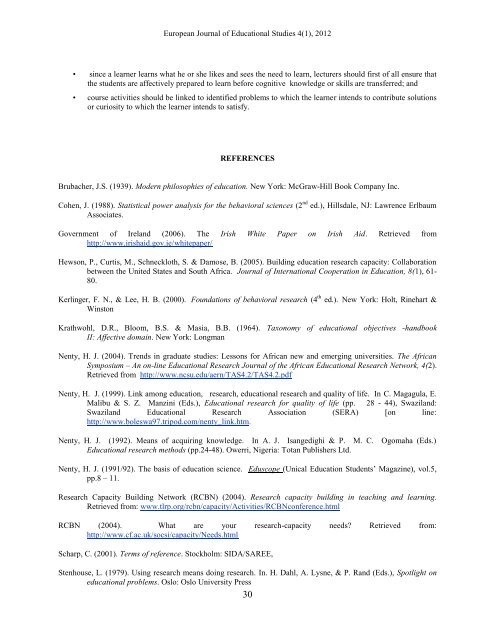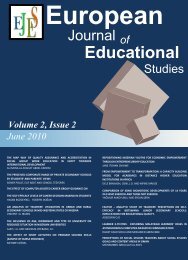Volume 4 Issue 1 (February 2012) - Ozean Publications
Volume 4 Issue 1 (February 2012) - Ozean Publications
Volume 4 Issue 1 (February 2012) - Ozean Publications
Create successful ePaper yourself
Turn your PDF publications into a flip-book with our unique Google optimized e-Paper software.
European Journal of Educational Studies 4(1), <strong>2012</strong><br />
• since a learner learns what he or she likes and sees the need to learn, lecturers should first of all ensure that<br />
the students are affectively prepared to learn before cognitive knowledge or skills are transferred; and<br />
• course activities should be linked to identified problems to which the learner intends to contribute solutions<br />
or curiosity to which the learner intends to satisfy.<br />
REFERENCES<br />
Brubacher, J.S. (1939). Modern philosophies of education. New York: McGraw-Hill Book Company Inc.<br />
Cohen, J. (1988). Statistical power analysis for the behavioral sciences (2 nd ed.), Hillsdale, NJ: Lawrence Erlbaum<br />
Associates.<br />
Government of Ireland (2006). The Irish White Paper on Irish Aid. Retrieved from<br />
http://www.irishaid.gov.ie/whitepaper/<br />
Hewson, P., Curtis, M., Schneckloth, S. & Damose, B. (2005). Building education research capacity: Collaboration<br />
between the United States and South Africa. Journal of International Cooperation in Education, 8(1), 61-<br />
80.<br />
Kerlinger, F. N., & Lee, H. B. (2000). Foundations of behavioral research (4 th ed.). New York: Holt, Rinehart &<br />
Winston<br />
Krathwohl, D.R., Bloom, B.S. & Masia, B.B. (1964). Taxonomy of educational objectives -handbook<br />
II: Affective domain. New York: Longman<br />
Nenty, H. J. (2004). Trends in graduate studies: Lessons for African new and emerging universities. The African<br />
Symposium – An on-line Educational Research Journal of the African Educational Research Network, 4(2).<br />
Retrieved from http://www.ncsu.edu/aern/TAS4.2/TAS4.2.pdf<br />
Nenty, H. J. (1999). Link among education, research, educational research and quality of life. In C. Magagula, E.<br />
Malibu & S. Z. Manzini (Eds.), Educational research for quality of life (pp. 28 - 44), Swaziland:<br />
Swaziland Educational Research Association (SERA) [on line:<br />
http://www.boleswa97.tripod.com/nenty_link.htm.<br />
Nenty, H. J. (1992). Means of acquiring knowledge. In A. J. Isangedighi & P. M. C. Ogomaha (Eds.)<br />
Educational research methods (pp.24-48). Owerri, Nigeria: Totan Publishers Ltd.<br />
Nenty, H. J. (1991/92). The basis of education science. Eduscope (Unical Education Students‟ Magazine), vol.5,<br />
pp.8 – 11.<br />
Research Capacity Building Network (RCBN) (2004). Research capacity building in teaching and learning.<br />
Retrieved from: www.tlrp.org/rcbn/capacity/Activities/RCBNconference.html<br />
RCBN (2004). What are your research-capacity needs Retrieved from:<br />
http://www.cf.ac.uk/socsi/capacity/Needs.html<br />
Scharp, C. (2001). Terms of reference. Stockholm: SIDA/SAREE,<br />
Stenhouse, L. (1979). Using research means doing research. In. H. Dahl, A. Lysne, & P. Rand (Eds.), Spotlight on<br />
educational problems. Oslo: Oslo University Press<br />
30

















